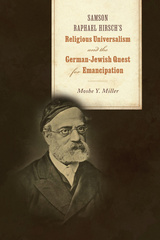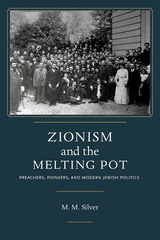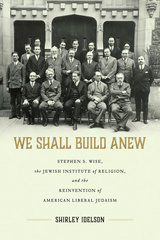Cosella Wayne
Or, Will and Destiny
Published serially in the spiritualist journal Banner of Light in 1860, Cosella Wayne: Or, Will and Destiny is the first coming-of-age novel, written and published in English by an American Jewish woman, to depict Jews in the United States and transforms what we know about the history of early American Jewish literature. The novel never appeared in book form, went unmentioned in Jewish newspapers of the day, and studies of nineteenth-century American Jewish literature ignore it completely. Yet the novel anticipates many central themes of American Jewish writing: intermarriage, generational tension, family dysfunction, Jewish-Christian relations, immigration, poverty, the place of women in Jewish life, the nature of romantic love, and the tension between destiny and free will.
The narrative recounts a relationship between an abusive Jewish father and the rebellious daughter he molested as well as that daughter’s struggle to find a place in the complex social fabric of nineteenth-century America. It is also unique in portraying such themes as an unmarried Jewish woman’s descent into poverty, her forlorn years as a starving orphaned seamstress, her apostasy and return to Judaism, and her quest to be both Jewish and a spiritualist at one and the same time.
Jonathan Sarna, who introduces the volume, discovered Cosella Wayne while pursuing research at the Israel Institute for Advanced Studies in Jerusalem. This edition is supplemented with selections from Cora Wilburn’s recently rediscovered diary, which are reprinted in the appendix. Together, these materials help to situate Cosella Wayne within the life and times of one of nineteenth-century American Jewry’s least known and yet most prolific female authors.
This fascinating volume by the little-known American Jewish writer Cora Wilburn offers new insight about Jewish women authors during the nineteenth century. Serialized literature, as much of this volume is, can seem slow when compiled into a single unit, and, moreover, nineteenth-century literary sensibilities can seem florid when compared to those of the twenty-first. Fortunately, Jonathan Sarna provides a penetrating analysis to help readers appreciate the significance and the literary strength of Wilburn’s work. . . . Readers can find much to reward their effort in this volume. The human search for meaning, solace, and a place in the world is not confined to any particular century.’
—The American Jewish Archives Journal
‘Once again Jonathan Sarna astonishes us. This time snippets of prose and poetry by an unknown nineteenth-century writer led him to discover Cora Wilburn, her diary, and her novel Cosella Wayne. Wilburn’s musings on immigration, poverty, family dysfunction, religious doubt, and spiritual seeking, drawn from her own life, compel a rethinking of the dawn of American Jewish literature and its themes. Thanks to this eminent historian, Cora Wilburn, a woman banished from our cultural memory, reclaims her rightful place.’
—Pamela S. Nadell, author of America’s Jewish Women: A History from Colonial Times to Today
Thanks to Jonathan Sarna’s literary-historical detective work, readers now have access to the first novel by a Jewish American woman writer. Complex and gripping, Cora Wilburn’s Cosella Wayne is a fascinating look at nineteenth-century women’s relationships to various religious movements—most notably, Judaism and spiritualism. An important source for scholars of religion, transnational literature, and American women’s writing, this edition is made more valuable by Sarna’s informative introduction and notes, as well as selections from Wilburn’s diary.’
—Lori Harrison-Kahan, editor of The Superwoman and Other Writings by Miriam Michelson and author of The White Negress: Literature, Minstrelsy, and the Black-Jewish Imaginary
Jonathan Sarna’s edition of Cosella Wayne renders accessible to general readers—as well as to students and scholars of modern history, women’s and gender studies, religion, and Jewish studies—the gripping tale of the global adventures and personal travails of its inimitable heroine, Cosella Wayne. Engrossing as a work of literature and enthralling as a window onto the life and world of its remarkable author, Cora Wilburn, Cosella Wayne is a family saga that grapples mightily with the nature of religious conversion, the implications of gender, the oppressiveness of poverty, and the destructiveness of child abuse. It paints intimate portraits of nineteenth-century Jewish and Spiritualist practices as well as of a courageous young woman’s search for truth, love, and belonging. This highly readable edition will be particularly welcome in university classrooms, where it will draw students deep into the fundamental questions that animate a range of disciplines.’
—Paola Tartakoff, Rutgers University
Jonathan D. Sarna is the Joseph H. and Belle R. Braun Professor of American Jewish History at Brandeis University and directs its Schusterman Center for Israel Studies. He is also chief historian of the National Museum of American Jewish History. He is author or editor of more than thirty books on American Jewish history and life, including American Judaism: A History.
Acknowledgments
Editor’s Introduction
A Note on the Text
Cosella Wayne: Or, Will and Destiny
Introduction
1. A Wandering Childhood
2. The Rhine Voyage
3. Foreboding
4. The Watcher by the Tomb
5. The Jewish Betrothal
6. Awakening
7. The Dawn of the New Life
8. The Dream’s Reply
9. Bereavement
10. The Web of Destiny
11. The Second Sorrow
12. Light on the Pathway
13. The Teachings of the Fathers
14. Temptation and Trial
15. The Virgin’s Shrine
16. The Step into the World
17. Spirit Teachings
18. Changes
19. Retribution
20. Manasseh’s Letter
21. Above the Clouds of Earth
22. The Realities of Life
23. Toil and Suffering
24. The Mission of the Beautiful
25. The Hour before Day
26. Unrecognized
27. Realization
28. The River of Death, and the Waters of Life
29. Fraternal and Heavenly Union
Notes to Cosella Wayne
Selections from the Diary of Cora Wilburn (1844–1848)

















